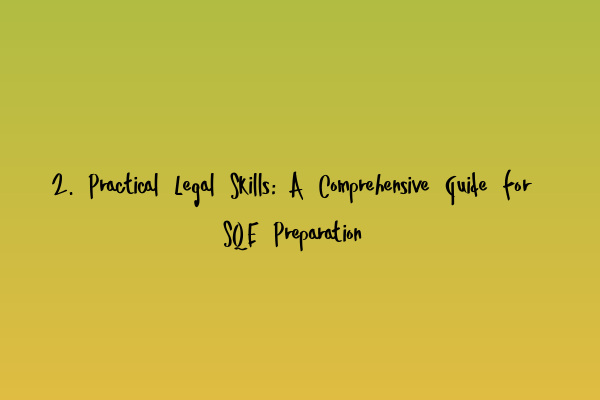Practical Legal Skills: A Comprehensive Guide for SQE Preparation
In order to succeed in the Solicitors Qualifying Examination (SQE), it is crucial to develop and master a wide range of practical legal skills. These skills will not only help you in passing the exam but also in your future career as a solicitor. In this comprehensive guide, we will explore the key practical legal skills that you need to focus on during your SQE preparation.
1. Legal Research
Legal research is the foundation of any legal practice. It involves analyzing and interpreting legal sources to find relevant information and precedents to support your legal arguments. To excel in legal research, you should become familiar with various legal databases and know how to effectively use search operators and filters. You can enhance your legal research skills by utilizing resources like online legal libraries and databases, as well as practicing with sample research tasks.
2. Legal Writing
Strong legal writing skills are essential for a solicitor. You should be able to communicate complex legal concepts clearly and concisely. Develop your legal writing skills by practicing drafting legal documents such as memos, contracts, and pleadings. Focus on your structure, clarity, and attention to detail. Additionally, familiarize yourself with the conventions and styles of legal writing, including the use of citations and proper legal terminology.
3. Case Analysis
Analyzing cases is a fundamental skill for a solicitor. You must be able to identify and understand the key legal issues, apply relevant legal principles, and present your analysis in a coherent and persuasive manner. Enhance your case analysis skills by regularly practicing with sample case scenarios and discussing them with your peers or mentors. Pay attention to the reasoning and logic used in previous court decisions to strengthen your analytical abilities.
4. Client Interviewing and Counseling
The ability to effectively interview and counsel clients is essential for building strong client relationships. Develop your client interviewing skills by practicing with realistic scenarios and focusing on active listening, empathy, and the ability to ask probing questions. Learn how to provide clear and accurate legal advice to clients, taking into account their individual circumstances and goals.
5. Negotiation and Mediation
As a solicitor, you will often find yourself in negotiation or mediation scenarios. These skills are crucial for resolving disputes and achieving desirable outcomes for your clients. Improve your negotiation and mediation skills by participating in mock negotiation exercises, studying negotiation theory, and learning how to identify and utilize different negotiation strategies. Practice active listening, effective communication, and the ability to find common ground with opposing parties.
6. Advocacy
Advocacy skills are particularly important if you plan to work in litigation. You must be able to present your client’s case persuasively in court and effectively cross-examine witnesses. To strengthen your advocacy skills, consider joining a mooting or debating society, practicing mock trials, and studying courtroom etiquette and procedure. Seek feedback from experienced advocates to refine your style and develop confidence in public speaking.
7. Time and Case Management
The ability to manage your time and cases effectively is critical for the success of a solicitor. Develop your time management skills by creating study schedules and sticking to them. Practice prioritizing tasks, setting realistic deadlines, and managing multiple deadlines simultaneously. Learn how to organize and maintain case files, as well as efficiently delegate tasks when working in a team.
To excel in the SQE, it is important to have a comprehensive understanding of these practical legal skills. Integrating them into your study routine will not only enhance your chances of passing the exam but also prepare you for the challenges of a legal career. Remember, continuous practice and seeking feedback are key to improving these skills over time.
For more tips and strategies to help you excel in the SQE, check out these related articles:
